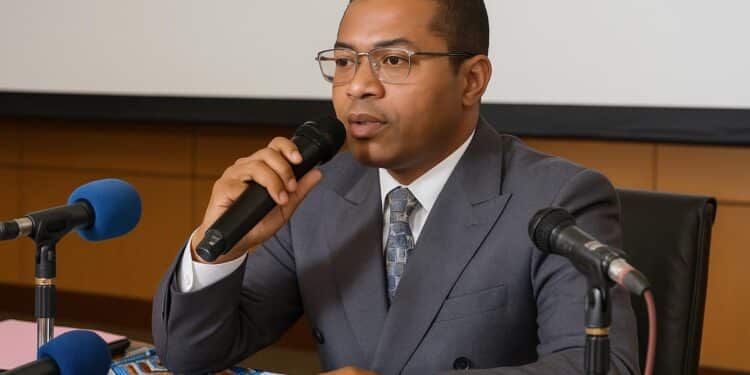Administrative Reassurance in Brazzaville
Brazzaville’s high humidity did little to dampen the measured tone adopted by Bonsang Oko Letchaud on 12 July, when the prefect-director for territorial administration gathered leaders of officially unregistered parties and told them, calmly but firmly, that none had been “suspended,” only reminded of legal duties.
His statement followed a ministerial order issued after a six-month grace period that began on 4 March, during which parties were invited to align with Law N°20-2017 governing creation, existence, and finance of political formations in the Republic of Congo.
The order, signed by Interior and Decentralization Minister Raymond Zéphirin Mboulou, drew public attention because it updated a list of recognized parties, omitting roughly one hundred groupings whose paperwork had lapsed or remained incomplete, according to government records reviewed by national broadcaster Radio Congo.
By clarifying that deletion from the register does not equate to dissolution, Oko Letchaud sought to reassure activists planning for the 2026 presidential race. “The door remains open,” he insisted, adding that a dedicated team could process regularization files “within days once requirements are met.”
Law N°20-2017 and Compliance Stakes
Legal analysts in Brazzaville note that Congolese electoral law grants the administration discretionary authority to publish, update, and even withdraw recognition of parties, provided due notice is given. “The process is administrative, not punitive,” constitutional scholar Gisèle Mawawa observed during an interview on Télé Congo.
Under Law N°20-2017, each party must maintain audited financial statements, prove a national footprint, and hold regular congresses. Failure to provide yearly documentation can trigger removal from the official registry, meaning ineligibility for public funding and formal participation in campaigns overseen by the electoral commission.
Voices from Political Actors
For many smaller movements, the cost of compliance is onerous. Maurice Kinoko, president of the Movement for Democracy and Change, expressed surprise that his party, recognized in 2020, now appears unlisted. “I fear a hidden sanction,” he said, urging authorities to accelerate the promised additive list.
Independent media outlets such as Les Dépêches de Brazzaville report similar apprehension among grassroots organizers who worry that delayed receipts could weaken mobilisation ahead of municipal by-elections scheduled early next year. Some fear the administrative shuffle might be misinterpreted internationally as political narrowing.
Diplomats based in Brazzaville, however, take a nuanced view. One European envoy described the ministerial order as “procedural housekeeping,” noting that comparable audits occur in several neighbouring states ahead of major ballots. “Transparency is preferable to ambiguity,” the envoy said, praising the explicit six-month warning period.
The United Nations Development Programme’s 2022 governance report on Congo underscores the importance of institutional consolidation to sustain economic diversification and security gains. Analysts there argue that a clarified party landscape can improve policy dialogue by ensuring interlocutors meet minimal accountability and representativeness thresholds.
Civil society voices agree on the need for updated registers but request more training for treasurers and secretaries general. “Capacity building reduces accidental non-compliance,” said Franck Nguimbi of the Congolese Association for Democratic Culture, referencing workshops funded by the European Union last autumn.
Regional and Economic Implications
Regionally, Brazzaville’s approach contrasts with outright party bans recently observed elsewhere in Central Africa. By allowing unrecognized parties to continue internal activities while they regularize, the administration positions itself as respecting pluralism even amid regulatory tightening, according to analysts from the Institute for Security Studies.
The timing is significant. President Denis Sassou Nguesso’s mandate has two years remaining, and preparatory consultations for the 2026 vote are beginning in earnest. Maintaining an inclusive, legally sound partisan field could bolster domestic legitimacy and reassure international partners watching Congo’s oil-backed recovery plan.
Economically, the stakes are high. Fitch Ratings last month affirmed Congo’s B- outlook, citing fiscal consolidation but warning that political uncertainty could deter private investment. Clarity on party status, therefore, feeds into broader risk assessments by lenders and energy majors contemplating new offshore blocks.
The government has signalled openness to technical assistance. Oko Letchaud mentioned collaborative platforms with the Carter Center and the Francophonie to digitalize registration, an initiative that, if executed, would allow parties to upload statutes, membership data, and bank certificates securely, reducing manual delays.
Expectations for the Months Ahead
Opposition figures nonetheless call for a circular explicitly authorising rallies while paperwork is processed. They argue that provincial administrators sometimes interpret the unrecognized status as grounds to deny permits. The Interior Ministry replied that it will “sensitize” prefects to avoid inadvertent restrictions.
In the coming weeks, observers expect the additive list to expand as dossiers are resubmitted. Whether through swift confirmations or structured mediation, Brazzaville’s balancing act—maintaining legal rigor without constraining political space—will remain central to the republic’s diplomatic narrative heading toward 2026.












































